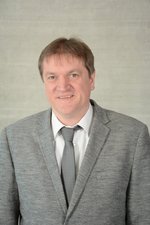Stuttgart, Vienna, Rotterdam and Wroclaw are the locations of a collaboration between the HFT Stuttgart and its international partners in the new DigiTwins4PEDs project. In case studies, researchers are investigating how the digital tool of the Urban Digital Twin can be used by citizens in their urban neighbourhoods to drive the energy transition towards "Positive Energy Districts" (PEDs).
The overall objective of DigiTwins4PEDs is to support the transformation towards sustainable and flexible energy use and efficient energy systems in urban districts. The EU Strategic Energy Technology Plan aims to create around 100 European "Positive Energy Districts" by 2025. These are districts that use sustainable technologies to produce more energy than they consume. In addition to technological innovation, there is also the task of social transformation, as the energy transition must also be driven and supported by citizens. The HFT Stuttgart has taken over the project management of DigiTwins4PEDs. The German sub-project is funded by the Federal Ministry of Economic Affairs and Climate Protection (BMWK) as part of the "Driving Urban Transitions" partnership.
Make better informed decisions
The Urban Digital Twin provides citizens with information that enables them to make better-informed decisions. It is a software application that vividly depicts 3D models of the urban environment and provides important infrastructure information. It can be used to model and analyse the infrastructure of a real city and simulate energy transition scenarios. It also enables energy performance monitoring, sustainability assessments, and information on the reduction of CO2 emissions. Flexibilisation strategies can be determined and visualised in the city districts, for example with regard to the availability and integration of renewable energies.
Stuttgart Nordbahnhofviertel case study
The case study in Stuttgart is the Nordbahnhofviertel with its neighbouring Rosensteinviertel, areas that are being planned as part of Stuttgart 21. In addition to infrastructure and social development, it is important for the Nordbahnhofviertel to develop together with Stuttgart 21 and the Rosensteinviertel in terms of energy. HFT Stuttgart's partner in this case study is the City of Stuttgart. Citizens are also involved in the project, including from the district centre, youth centre, schools and non-profit organisations.
DigiTwins4PEDs works with residents and interest groups to identify obstacles to energy flexibility at district level, among other things. Various stakeholders work together in what is known as a Living Lab and drive developments forward together. The aim is also to learn from each other and initiate co-creation processes through cooperation among researchers, civic activists, and partners from the municipalities.
In addition to the Stuttgart case study region, the approaches are also being tested in Vienna, Rotterdam, and Wroclaw. Other DigiTwins4PEDs partners are the Austrian Institute of Technology GmbH (AIT), the City of Vienna, the University of Natural Resources and Life Sciences Vienna (BOKU), Delft University of Technology (TU Delft), the City of Rotterdam, Infosolutions Sp. z o.o. and the University of Wroclaw (Uniwersytet Przyrodniczy we Wroclawiu).
Future-orientated questions are examined
- How do Living Labs and UDT-based tools foster information sharing and community development of energy solutions to support sustainable urban transformation driven by civil society?
- How can a data-driven methodology be developed to identify urban typologies within existing neighbourhoods that have high potential for transformation into Positive Energy Districts (PEDs)?
- How can urban challenges in different case studies lead to capacity building, knowledge transfer and identification of best practices to transfer and improve project results to other urban areas within the EU and also globally?
![[Image: Transferportal der HFT Stuttgart]](/fileadmin/Dateien/Forschung/_processed_/d/1/csm_20231201_DigiTwin4PEDSKesselkompass_2_Nordbahnhof_24d3a0766d.png)
![[Image: HFT Stuttgart]](/fileadmin/Dateien/Forschung/_processed_/4/a/csm_20231201_DigiTwins4PEDS_Masterplan_051ca80453.png)
![[Image: HFT Stuttgart]](/fileadmin/Dateien/Forschung/News/20231201_DigiTwin4PEDS_Co-Creation.png)

![[Image: HFT Stuttgart]](/fileadmin/Dateien/Forschung/News/2023_1201_DigiTwin4PEDs_LOGO_BMWK_Fz_2017_Office_Farbe_en.png)